Data Overload is real for almost everyone in 2018, but lawyers have exceptionally high ethical standards on their ability to manage it. Tool Option Overload is real too, so get control now with this practical approach to Evernote.
Attorneys are bombarded from every direction, many times with competing demands from clients, colleagues, staff, and family. If you don’t have a way to manage all of it, your world becomes utter chaos. Research suggests that when your environment is in a state of disarray, your attention is drawn away from what you need to focus on, and the appearance that your work is never done adds to stress. What’s more, that chaos can lead to malpractice or an ethics violation.
Chaos results not only from external obligations, but also from internal pressure. The average person has approximately 70,000 thoughts per day. That’s 49 thoughts per minute. No wonder research shows that we spend nearly half of our waking hours thinking about something other than what we are currently doing. Suffice to say, lawyers have a lot of stuff (internal and external) to keep stored, organized,and accessible when needed.
To avoid chaos and the parade of horribles that follows, you need to figure out what to do with all that stuff. Is it sprinkled throughout Word documents saved somewhere on your hard drive? Is it handwritten on notepads piling on top of your desk? Is it overloading your brain? Or, is it neatly tucked away in a central repository of information that you can access wherever and whenever you need it? If it’s not already the latter, then keep reading.
WHAT IS EVERNOTE AND HOW DO I GET IT?
Evernote is that memory aid and organizational tool for all your data. In the words of Evernote’s co-founder, Phil Libin, Evernote is “Your brain offloaded to a server. It’s Google for the Web of your life. It’s a spotlight on dark matter of your universe. It’s a tool for converting your smartphone from a time killer to a time saver.” More precisely, Evernote allows you to collect, organize and access data; save and store web articles and e-mails; draft content and take notes; collaborate with others; annotate PDFs; and much, much more. Rather than spend hours searching for those client notes you saved on your computer or mobile device, or a to-do list that you left the other day somewhere on your desk, make Evernote your single and central repository for information. By making it fast and easy to get information into Evernote, as well as providing sophisticated yet intuitive search functionality, Evernote gives you access to all your important data right at your fingertips. Using Evernote’s notebooks and tags keeps all your data organized and easy to maintain.
You can sign up for a free Evernote account at www.evernote.com. You can access Evernote through your web browser, and you can download it to your desktop and mobile device. Evernote also makes apps for wearables, including the Apple Watch and Android Wear.
HOW DO I USE IT IN MY LAW PRACTICE?
Time and time again, I talk to attorneys who say they have either heard of or have downloaded Evernote but don’t know what to do with it. They know it could be helpful, but just don’t know where to start. I’m going to help you out by suggesting five ways you can start using Evernote in your law practice today.
1. Saving and Organizing Legal Research
Evernote owes much of its popularity to its web clipper tool. At least when Evernote was first developed, the web clipper was an unrivaled tool. Most attorneys who use Evernote in their law practices use the web clipper to save and organize their legal research. With the web clipper, you can save articles, text, and images from the web directly into Evernote. Download the web clipper browser extension from here for Chrome, Safari, Internet Explorer 7+, Firefox, Opera, and mobile platforms. To save any web page or article from the Internet, simply click on the extension in your browser and give the clip a name, select the format for saving, select which notebook to save it to, and assign it a tag for further organization (if desired). You can do the same on the go from your mobile device.
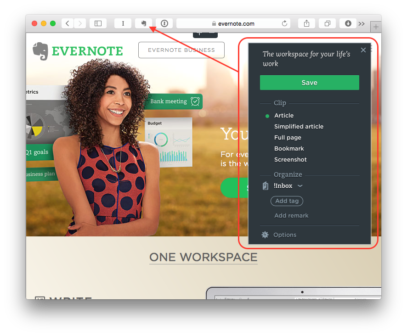
Now, imagine collecting and organizing your legal research this way rather than printing case after case for each matter you work on. You can organize your research into topical notebooks, such as Employment Discrimination, Landlord Tenant, Search and Seizure, etc. Then, when you save individual research files, such as case law, you can assign it to the proper topical notebook and tag it with identifiers such as the matter(s) it references, its case proposition and disposition, fact pattern, and jurisdiction. The next time you need a SCOTUS case on sex discrimination, you can use Evernote search terms to retrieve it. No more wasting time searching through stacks of printed case law for that one case proposition you need, or reinventing the wheel by doing sophisticated searches in Westlaw or Lexis to locate something you’ve previously found.
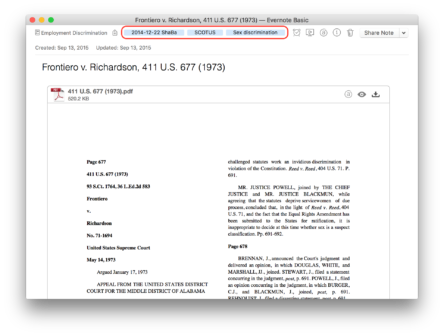
2. Collecting Business Cards
While much of the data we now collect is electronic, physical business cards have yet to go out of style. The question is: What do you do with all those business cards you brought home from last night’s networking event? Do you leave them on your desk to inevitably be trashed, or put them in a box in perpetuity never to be referenced again? Instead, upload them immediately to an electronic database. Evernote can do this for you with its business card tool. By snapping a photo of a business card using the Evernote app from your mobile device, all the relevant information is immediately collected and imported into your Evernote account, as well as other contact databases such Outlook, iCloud, and Google. You can also use Evernote’s one-click LinkedIn feature to find your business card contact in LinkedIn and request a connection.
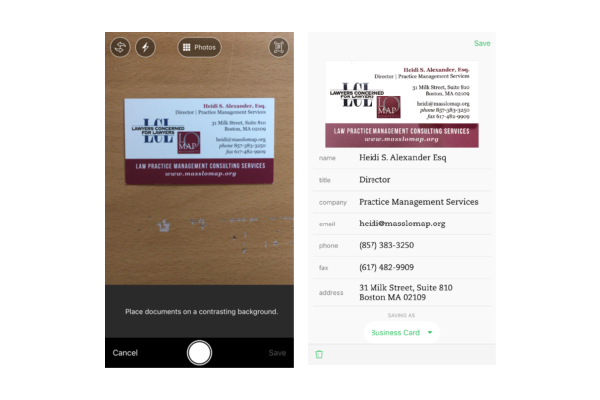
3. Save and Search for Meeting Notes
Evernote is an excellent tool for quickly taking, saving, and searching for meeting notes. Start a note with a click of a button from your computer or mobile device. Evernote automatically saves the note and syncs it to all your devices when you are connected to the Internet.
You can also save handwritten notes as searchable PDFs by using Evernote’s built-in mobile photo tool to snap a picture of your handwritten notes for direct upload to your Evernote account. You can also scan multipage notes with Evernote’s Scannable app or with a physical scanner. Some scanners will allow you to scan directly to Evernote (i.e. Fujitsu ScanSnap) while others might require you to first scan to your computer and then drag and drop the file into Evernote.
With Evernote’s built-in optical character recognition, allowing you to find text (typewritten or handwritten), nearly everything in Evernote is searchable, making it difficult to lose track of information you’ve saved.
Once you’ve saved your notes to your account, you can share them with others (both Evernote users and non-users) in a variety of ways. First, you can share a static note by sending it via e-mail directly from your Evernote account. Second, you can share a unique web link that will reflect any changes you make to the note in real time. Third, you can share your note via the Evernote Work Chat feature to collaborate with other Evernote users.
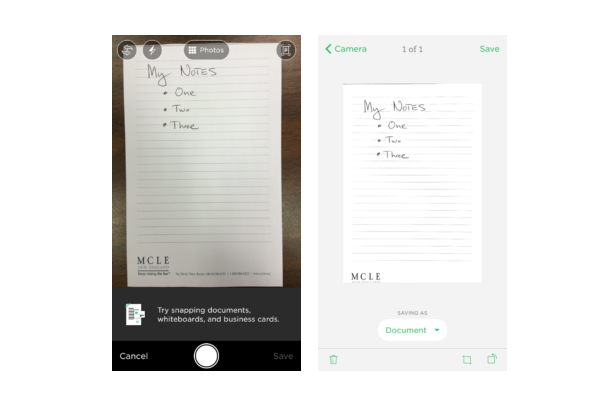
4. Clear Your Email Inbox with Email Forwarding
You can save emails into Evernote by forwarding emails to your Evernote account using a unique Evernote email address (for premium users only) or by using the free Evernote web clipper with Gmail or free Evernote add-on for Microsoft Outlook.
When forwarding emails to your Evernote account, you can use the subject line of the email to give the note a title, specify the notebook, add a tag, and even create a reminder. For example, let’s say you want to save an email with information about a response to a motion that you need to file by a certain date. By adding the following email subject line to the e-mail forward: Response to Motion !2017/01/15 @Case File XYZ #response #state court
You’ll save a note entitled “Response to Motion” with a reminder for January 17, 2016 in the notebook “Case File XYZ” with tags “response” and “state court.” Within a moment, you will have cleared that email from your inbox and saved the information in your Evernote notebook to return to when you are notified via Evernote’s reminder feature.
5. Keeping Important Office Data
Whether you run your own practice or work for someone else, you have important administrative data that you need to track. This might include general office and systems information as well as CLE certificates, travel itineraries and receipts, and frequently used forms and templates. By emailing, saving, scanning, attaching or clipping information to Evernote, you’ll keep it well-organized and easily accessible, as well as have the ability to share it with others.
To allay concerns over storing highly sensitive data, such as financial information, Evernote provides client-side encryption for an extra layer of security on top of its own encryption at-rest and in-transit. This enables you to encrypt selected text within individual notes. Only you hold the encryption key.
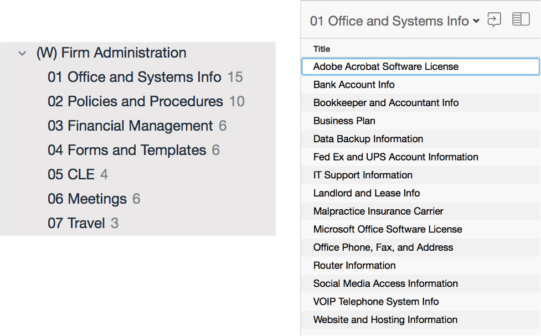
GET ORGANIZED, BOOST FOCUS: TRY EVERNOTE.
Get a jumpstart on using Evernote with the above five uses. Once you get going, you’ll be well on your way to a clearer and more focused space and mind. That means more time advocating for clients, billing and collecting more, and maybe even taking a break. Now, isn’t that a lovely thought?
Once you’re ready to advance with Evernote in your law practice, find out everything you need in Evernote as a Law Practice Tool (published by the ABA). There’s a copy or two in our lending library, so lawyers and law students in Massachusetts can borrow it from us for free — if you’re interested, just email rachel@masslomap.org. And if you’re a lawyer or law student in Massachusetts and love it so much that you need to own a copy and can’t afford to, again, just email rachel@masslomap.org.
And there are a couple other ways to learn more.
This webinar from PracticePanther highlights how Evernote will help you accomplish more in your workday.
This podcast from Legal Talk Network’s The Digital Edge offers a helpful overview on how lawyers can apply Evernote functionality to organize their research, marketing, and process.
. . .
©2017. This article was originally published in The Alternative Careers Issue of Law Practice Today, September 2017, by the American Bar Association. Reproduced with permission. All rights reserved. This information or any portion thereof may not be copied or disseminated in any form or by any means or stored in an electronic database or retrieval system without the express written consent of the AmericanBar Association or the copyright holder.



